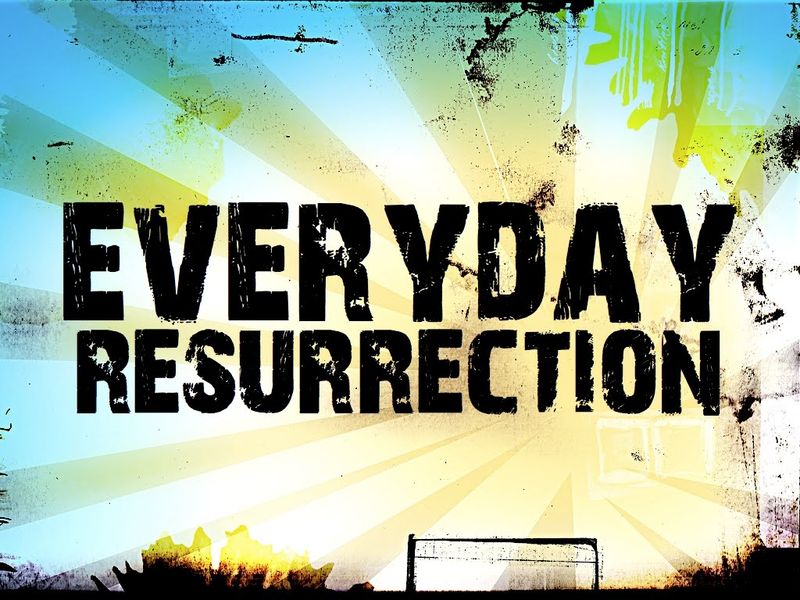 Mt Hawthorn Community Church are on Easter camp, and they have asked me to preach for them this morning. Here is an outline of what I intend to say…
Mt Hawthorn Community Church are on Easter camp, and they have asked me to preach for them this morning. Here is an outline of what I intend to say…
The text is Colossians 3:1-17.
So if you have been raised with Christ, seek the things that are above, where Christ is, seated at the right hand of God. Set your minds on things that are above, not on things that are on earth, for you have died, and your life is hidden with Christ in God. When Christ who is your life is revealed, then you also will be revealed with him in glory.
1. The central feature of this text, and indeed the whole central section of Colossians (i.e. 2:6 – 4:6) concerns our union with Christ and most specifically, our union with Christ in his death and resurrection. We have died with Christ, been buried with Christ, made alive with Christ, raised with Christ so that now our lives are hidden with Christ in God. Why this emphasis? What is going on at Colosse that Paul would write like this?
2. The Colossian church is a young church of young believers, under threat from false teachers who want to lead them into forms of spirituality beyond Christ and in addition to Christ. The false teaching is a curious mix of Jewish legalism, pagan philosophy and mysticism, and religious asceticism (see especially 2:8-23). Paul’s argument is simple: we are already united with Christ in his resurrection: there is nothing else to gain! Our lives are already hidden with Christ in God. We are the heirs of his glory – why, O why would we seek something else somewhere else? In him is all the fulness of the Godhead bodily – and you have been made complete in him (Colossians 2:9-10).
Does this mean, therefore, that Christians can be careless about the way they live, that there is nothing to the Christian life? God forbid! Although he does not say here, this is the kind of response Paul would make to this question. For Paul, the Christian life consists in learning to live more deeply from and into our union with Christ – in his death, and in his resurrection. What does it mean to practise resurrection?
3. Learning to Say NO!
Colossians 3:5-11 instruct us to “put off” the identity and ways of the old world.
What kinds of things are we to ‘put off’? Selfish, unrestrained sexuality, unfettered greed, anger and hatred, prejudice and violence. This is a spirituality of resistance to the ways of the world which are inherently idolatrous and destructive—to ourselves, to others, and to God’s good creation. These things afflict pain on people and destruction on community.
According to Ron Sider (The Scandal of the Evangelical Conscience, 97, 103),
God’s grand strategy of redemption does not focus on redeeming isolated individuals; it centers on the creation of a new people, a new community, a new social order that begins to live now the way the Creator intended….The church is a new, visible social order. It is a radical new community visibly living a challenge to the sexual insanity, the racial and social prejudice, and the economic injustice that pervade the rest of society.
4. Learning to say YES!
What of the positive content of Christian life, spirituality and ethics? Not only is the community a community of resistance to the ways of the world, but it is also called to positively exhibit the life and character of the coming kingdom. We are called to live the lifestyle of heaven here on earth, the life of the future now in the present. This involves learning what it means to be a community of character, a community of peace, and a community of worship.
Christian life is life-in-community bearing witness to the God’s kingdom of love, righteousness and peace. Thus, to practise resurrection involves:
- A spirituality of faith and rest, resting from our own works because we trust fully in the work of Christ on our behalf;
- A spirituality of resistance and nonconformity to the destructive and idolatrous ways and practices of this world;
- A spirituality of bearing witness to a radically new kind of life in community, where love of God and love of others is the foundation and goal of all we do.
*****
Well, the morning (not necessarily the sermon!) went well. Mt Hawthorn Community is not a conservative congregation, but they are intelligent and thoughtful and bring a good level of discussion, reflection and question to their faith. The sermon moved to discussion during point four above and the discussion continued for 20 minutes during the service, and then for a further 30 or 40 minutes afterwards. One of the things I appreciate at Mt Hawthorn is that every sermon is followed by a time of Q&A during which the congregation engage with the material. It helps keep preaching honest and grounded.